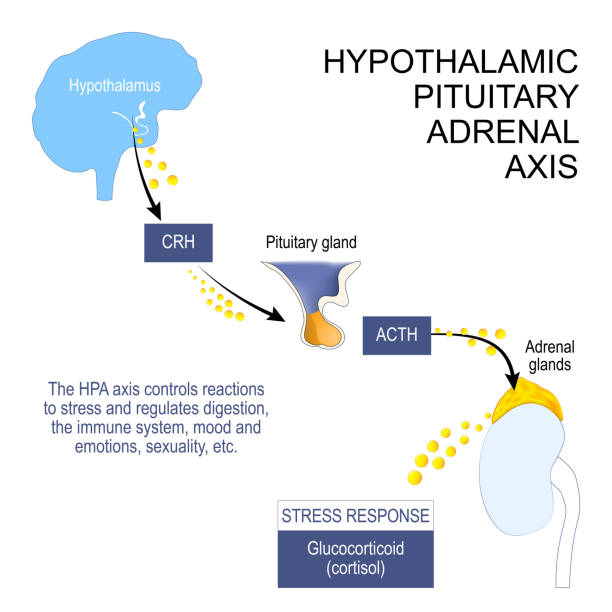Dealing with exhaustion, body aches, and digestion problems? Could it be adrenal fatigue? You may have heard of this term, which is used to describe symptoms that appear to be related to an overload of chronic stress. The concept is that when the body is under duress, the adrenal glands pump out the stress hormones cortisol and adrenaline. The theory goes that when stress is constant, it wears out the adrenal glands. But this theory leaves out one very important part of this equation—the brain.
It is the brain—and in particular, the hypothalamus and pituitary gland—that is controlling the action. Together with the adrenal glands, they form the HPA axis, which regulates the way your body responds to stress.
What is the HPA Axis?
This hardwired response happens automatically upon activation, such as witnessing or experiencing an emotional or physical threat. Your heart beats faster, breathing and blood pressure increase, hands and feet become cooler to shunt blood away from the extremities to the big muscles (to help you defend yourself or run away), and the pupils dilate (to see better).

The Hypothalamus
This part of the brain is about the size of a pearl and is an important part of the brain that is responsible for translating our emotional state into physical feelings of relaxation or tension. The back half of the hypothalamus sends stimulating or fear signals to the body and is responsible for the fight-or-flight response—a primitive state that gets us ready to fight or flee when we are threatened or scared. When stress hits, the hypothalamus releases hormones that prompt the pituitary gland to start secreting other hormones.
The pituitary gland
A pea-sized organ located at the base of the brain is considered the body’s “master gland” because it produces many hormones. One of its jobs is to stimulate other glands within the body to secrete other hormones. When the hypothalamus alerts the pituitary gland to stress, the pituitary release adrenocorticotropic hormone (ACTH), which then signals the adrenal glands to start spewing out those stress hormones.
The Adrenal Glands
These glands are small organs situated above the kidneys. They take their cue from the pituitary gland and begin pumping out cortisol and adrenaline.
For our cave-dwelling ancestors, this stress reaction helped us stay alive by helping us run from predators—think sabre-tooth tigers or an encroaching tribe. In today’s world, it is things like mind-numbing traffic, impossible deadlines, or over-exercising that can set this process in motion.
Chronic Stress and the Brain
When stress becomes chronic, the HPA axis gets stuck on high alert, and the brain keeps telling the adrenals to continue releasing stress hormones. This may cause the adrenals to become depleted, but it is the brain that is in the driver’s seat. Brain imaging studies show that chronic stress has serious impacts on the brain. It constricts blood flow to the brain, which lowers overall brain function, and it also drains your emotional well-being and is associated with anxiety, depression, and Alzheimer’s disease. Unrelenting tension can also wreak havoc with gut health, which is involved in producing neurotransmitters, such as serotonin.
Treating Adrenal Fatigue by Optimising Brain Health
The key to reducing chronic stress and reestablishing a healthier HPA axis is to enhance your overall brain health. Here are 11 strategies that can help –
- Reduce the intake of sugar, artificial sweeteners, and caffeine
- Avoid excessive alcohol consumption
- Eliminate gluten
- Avoid excessive high-intensity exercise
- Meditate or pray on a regular basis
- Learn to delegate
- Practice gratitude
- Laugh more
- Support gut health with probiotics
- Optimize vitamin D levels
- Take omega-3 fatty acids
Contact Balanced Healing for your personalised adrenal fatigue treatment plan.
Reference
Website – https://www.amenclinics.com/blog/is-it-adrenal-fatigue-or-is-it-your-brain/

